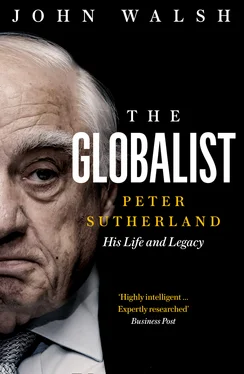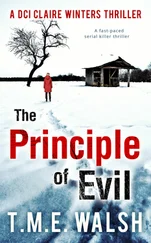The wording of the amendment was as follows:
The State acknowledges the right to life of the unborn and, with due regard to the equal right to life of the mother, guarantees in its laws to respect, and, as far as practicable, by its laws to defend and vindicate that right.
Noonan says that when the proposed legislation was published, it looked as if it would have a seamless passage through the Oireachtas. ‘Then there was speculation that there could be trouble over the wording. Peter [Sutherland] gave informal advice first that there were problems with the wording. Then it became very difficult to proceed. There were a number of problems with the wording but he focused on possible risks to the life of the mother.’
According to Noonan, his officials in the justice department also identified problems with the wording of the amendment. In particular they believed that it was ambiguous and that it would be challenged in the Supreme Court, which could potentially pave the way for the introduction of abortion in certain cases. ‘Both Peter and myself were telling the government there was a difficulty, there was a different emphasis. He said there was a risk to women and the risk I was bringing to cabinet was that the amendment was not fit for purpose and instead of closing out abortion, which was the intent, it would open the door to it.’
The following passage is taken from Sutherland’s private papers:
I had considered the proposed amendment carefully, over a number of months and had sought and consulted with a range of expert opinion (medical and legal) both in Ireland and further afield (principally from the US). The text of the proposed amendment presented a number of problems and these stemmed from a lack of precision in drafting. In my opinion, it was not a suitable implement with which to copper fasten the status quo. The language used, specifically around the notion of ‘unborn’ and of ‘equal right to life’, appeared to leave the matter open to interpretation in the (inevitable) event of a future appeal to the courts. This was precisely the outcome that those behind the proposal had intended to frustrate. The proposed amendment offered neither clarity nor closure on the issue. It was not fit for purpose. I presented my opinion on the wording by way of a memorandum to cabinet. The text of that opinion was subsequently released for publication.[1]
When it emerged that Sutherland had raised concerns about the amendment and its potential consequences, there was a furious backlash in the Dáil, and indeed on the part of the pro-life lobby groups. They interpreted it as an attempt by the government to renege on the pledge it had made during the election campaign. Fianna Fáil in particular had a sizeable contingent of ardent pro-lifers within its ranks, but Fine Gael also had a considerable number. FitzGerald was on the horns of a dilemma. Knowing that the wording was deeply flawed, but that politically the matter had become toxic, he took the unprecedented step of publishing Sutherland’s advice on the wording:
In summary: the wording is ambiguous and unsatisfactory. It will lead inevitably to confusion and uncertainty, not merely amongst the medical profession, to whom it has of course particular relevance, but also amongst lawyers and more specifically the judges who will have to interpret it.
Far from providing the protection and certainty which is sought by many of those who have advocated its adoption, it will have a contrary effect. In particular it is not clear as to what life is being protected; as to whether ‘the unborn’ is protected from the moment of fertilisation or alternatively is left unprotected until an independently viable human being exists at 25 to 28 weeks.
Further, having regard to the equal rights of the unborn and the mother, a doctor faced with the dilemma of saving the life of the mother, knowing that to do so will terminate the life of ‘the unborn’ will be compelled by the wording to conclude that he can do nothing. Whatever his intention he will have to show equal regard for both lives, and his predominant intent will not be a factor.
In these circumstances I cannot approve of the wording proposed. [See Appendix 2 for Sutherland’s full advice.]
The most politically expedient thing for Sutherland to do would have been to put his conscience to one side and proceed with the proposed legislation as best he could. After all, opposing the pro-life lobby on this issue was a strategy freighted with risks – not least the very public backlash from SPUC and PLAC. Nicholas Kearns says it was a very traumatic time for Sutherland and his wife Maruja. ‘Things were arriving at home in the post, nasty letters and so on. I know he was more concerned about Maruja than himself. His warning on the Eighth was brushed aside at the time, but it subsequently came to pass.’ Sutherland was a practising Catholic, but events relating to the Eighth Amendment would suggest that he had great courage and his convictions were much more nuanced.
Dukes says that Sutherland was a man of deep faith ‘but he was a powerful thinker as well. I think what he proposed for that amendment in no way compromised his faith. I think Peter, as a lawyer and AG, would have been quite categoric about the need for separation of church and state, although I never discussed that with him.’
According to Gemma Hussey it was one of Sutherland’s ‘finest moments … He was very clear and despite his own inner convictions about abortion and everything, he was absolutely clear about it. Yes he was an extraordinary Christian in the best sense of the word.’
But then again, Hussey says, she didn’t know exactly what Sutherland’s views on abortion were. Neither did his close friends. He was a man of deep faith, but he certainly didn’t broadcast his beliefs. In this case, he was first and foremost the attorney general to the government and he saw it as a moral obligation to flag any potential legal problems with a piece of legislation.
Mary Robinson, who would become president of Ireland in 1990, was at the time a member of the Senate and one of the leading campaigners in the country against the Eighth Amendment. ‘Peter was trying to get Fine Gael to come out on the right side of the issue. I was actively warning in the Senate about the implications of equating the right to life of the mother with the unborn and that this proposal would be a terrible future for women. Peter was aware of these dangers. He was a very serious Catholic but in my view he wasn’t a conservative Catholic,’ she says.
Garret FitzGerald eventually announced that he was unhappy with the wording and that an alternative form of words would have to be found. The attorney general’s office said it would find words that would work. Sutherland consulted widely on the next course of action. It is understood he took soundings from Niall McCarthy, one of the leading members of the Law Library and another future Supreme Court judge. According to Garrett Sheehan, Sutherland had been very close to the Maynooth theologian Enda McDonagh, and had discussed the issue extensively with him.
Sutherland produced an alternative wording: ‘Nothing in this constitution shall be invoked to invalidate, or to deprive of force or effect, any provision of a law on the ground that it prohibits abortion.’
The new wording was put in a memorandum, copies of which were made in the Irish Life building on Abbey Street where the Department of Justice had a sub-office. During the process, a copy was leaked to Oliver Flanagan, a Fine Gael TD who had a reputation as a fire-and-brimstone arch-conservative. When Flanagan brought up the memorandum at a Fine Gael parliamentary meeting, consternation ensued.
David Byrne says Sutherland’s performance as attorney general at the time was ‘masterful … His wording for the Eighth Amendment I thought was excellent. I agreed with him then and I still agree with him to this day.’ Byrne had campaigned against the original wording. At the time he was a member of Fianna Fáil, and among a very small minority of the party who opposed the Eighth Amendment. He initiated, together with Frank Clark (who is now the Chief Justice), a petition signed by one hundred barristers in the Four Courts which expressed dissatisfaction with the wording that was being advanced.
Читать дальше












